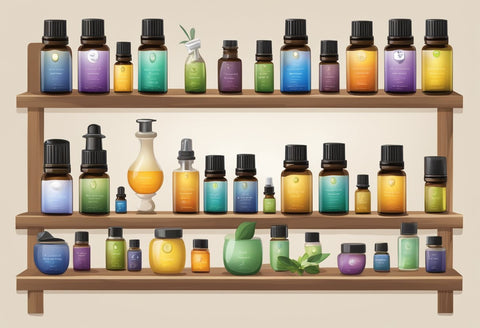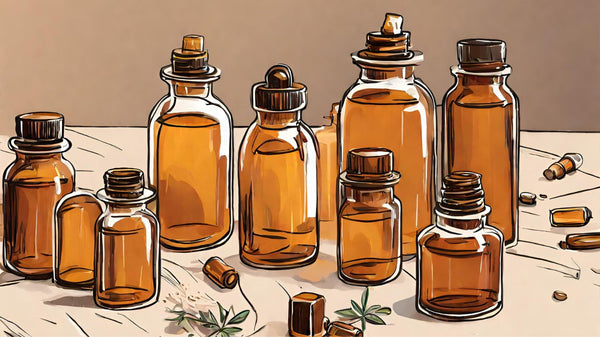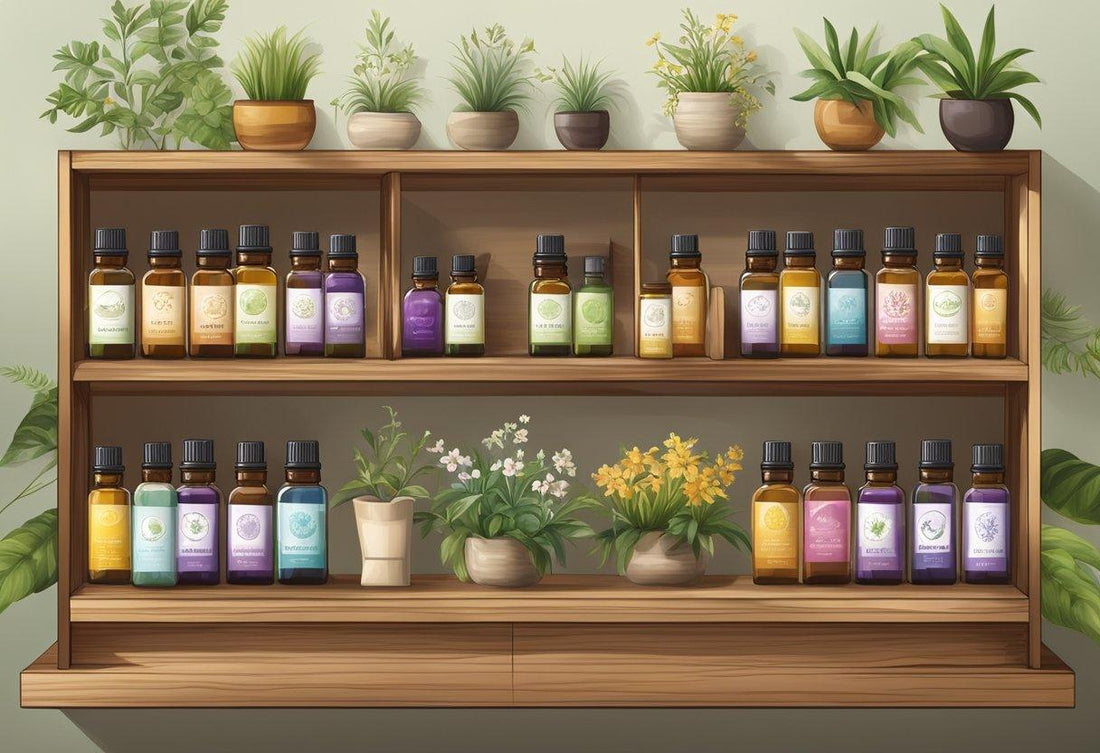Essential oils have become increasingly popular in recent years, with many people incorporating them into their daily routines for their potential health benefits. However, proper storage is essential for maintaining the quality and effectiveness of these oils.
In this article, we will provide a complete guide to store essential oils to ensure that you get the most out of your oils.
Key Takeaways
Storing essential oils properly is crucial to ensure their longevity and effectiveness. Here are some key takeaways to keep in mind when storing essential oils:
-
Essential oils should be kept in a cool, dark place, away from direct sunlight and heat sources. This is because heat and light can cause the oils to deteriorate and lose their potency.
-
Essential oils should be stored in dark glass bottles, such as amber or cobalt blue, to protect them from light. Clear glass bottles should be avoided as they do not provide adequate protection.
-
Essential oils should be stored with their lids tightly closed to prevent oxidation, which can cause the oils to go rancid.
-
Essential oils should not be stored in plastic containers as they can react with the plastic and cause the oils to degrade.
-
Essential oils should be labeled and dated to keep track of their age and usage. This is especially important if you have many different oils in your collection.
Choosing the Right Storage Container

Proper storage of essential oils is crucial to maintain their quality and potency. Choosing the right storage container is important to ensure that the oils remain fresh and potent for a longer time.
Here are some factors to consider when choosing the right storage container for your essential oils:
Glass vs. Plastic Containers
Glass containers are the most preferred storage containers for essential oils as they are non-reactive and do not release any harmful chemicals into the oils. Glass containers also protect the oils from light and air, which can cause the oils to degrade over time.
On the other hand, plastic containers are reactive and can release harmful chemicals into the oils, especially when exposed to heat or light. Therefore, it is recommended to avoid plastic containers for storing essential oils.
Dark-Colored vs. Clear Containers

Essential oils should always be stored in dark-colored containers such as amber or cobalt blue glass bottles. These dark colors protect the oils from light, which can cause the oils to degrade over time.
Clear glass containers do not offer adequate protection from light and should be avoided for storing essential oils.
Sealable vs. Non-Sealable Containers
It is recommended to store essential oils in airtight containers to prevent them from oxidizing and losing their potency.
- Airtight containers also prevent the oils from evaporating and protect them from moisture.
- Glass bottles with rubber orifice reducers and screw-on caps are excellent for storing essential oils as they provide a tight seal.
- Aluminum and stainless steel containers are also airtight and can be used for storing essential oils, but they are not as popular as glass containers.
Storing Essential Oils - What are the Ideal Conditions?
When it comes to storing essential oils, it is essential to keep them in a cool, dark place, away from direct heat and sunlight exposureProper storage can help preserve the oils' quality, potency, and shelf life.
Importance of Keeping Oils Away from Heat and Sunlight
Essential oils are sensitive to light and heat. Direct sunlight and heat sources can cause the oils to break down and lose their potency. Temperature fluctuations can also affect the oils' quality. To avoid these issues, it is best to keep the oils away from light and heat sources.
Ideal Temperature and Humidity Levels for Storing Oils
- The ideal temperature for storing essential oils is between 60-68°F (15-20°C).
- High temperatures can cause the oils to evaporate quickly, while low temperatures can cause the oils to solidify or thicken.
- Humidity levels should also be kept low, as high humidity can cause the oils to oxidize and degrade.
Recommended Storage Locations
There are several recommended storage locations for essential oils. A cool, dark place in the home or office, such as a cabinet or storage box, is an excellent choice.
The storage location should be away from direct sunlight and heat sources, such as radiators or windows.
Some people also choose to store their oils in the refrigerator, which can help prolong their shelf life.
However, it is essential to note that some oils may solidify or thicken in the fridge, so it is best to check the oil's label or consult a reference guide before refrigerating.
Properly Sealing and Labeling Essential Oils
In this section, we will discuss the importance of sealing oils tightly, using labels to keep track of oils, and tips for organizing and categorizing oils.
Importance of Sealing Oils Tightly
When essential oils are exposed to air, they can oxidize and lose their therapeutic properties. Therefore, it is important to store essential oils in airtight containers to prevent oxidation.
Glass bottles with tight-fitting lids are the best containers for storing essential oils. Plastic containers should be avoided because they can react with the oils and cause them to deteriorate.
Using Labels to Keep Track of Oils
Proper labeling of essential oils is crucial for identifying them and keeping track of their shelf life.
Labels should include
- the name of the oil
- the date of purchase
- the expiration date
This information can be used to determine the quality and freshness of the oil. Additionally, labels can be used to indicate the best uses for each oil and any safety precautions that should be taken.
Tips for Organizing and Categorizing Oils
Organizing and categorizing essential oils can help you find the oil you need quickly and easily. There are many ways to organize essential oils, including by
- their therapeutic properties
- alphabetical order
- or color
Travel cases and wooden boxes are popular storage options because they are portable and can be easily organized.
Extending the Shelf Life of Essential oils
Using Carrier Oils
Using carrier oils is a great way to dilute essential oils before applying them to the skin. This not only helps to prevent skin irritation, but also extends the life of the more expensive essential oils. Common carrier oils include jojoba, coconut, and almond oil.
Avoiding Contamination and Oxidation
- Always use clean and sterilized containers and equipment when handling essential oils.
- It is important to keep essential oils tightly sealed to prevent oxidation, which can lead to a loss of potency and therapeutic benefits.
Safe Handling and Storage Practices
Safe handling and storage practices are important when dealing with essential oils.
- Keep them out of reach of children and pets to prevent accidental ingestion or spillage.
- Properly dispose of expired or unused oils to avoid any potential risks.
- Always store oils in a well-ventilated area to prevent them from going rancid and to ensure their potency remains intact.
Frequently Asked Questions - FAQs
What to do with expired essential oils?
Expired essential oils can be used for cleaning purposes, such as making natural cleaners or adding fragrance to homemade soaps. However, for therapeutic use, it's best to replace them.
At what temperature do essential oils freeze?
The freezing point of essential oils varies depending on the specific oil. Generally, most essential oils will start to solidify or thicken at temperatures below 32°F (0°C).
What are creative ways to store essential oils?
Creative storage solutions for essential oils include using wooden storage boxes, decorative trays, spice racks, or even repurposing old jewelry boxes with dividers to keep the bottles organized and protected from light.
What holds essential oil smell longest?
Dark glass bottles, such as amber or cobalt blue, are ideal for storing essential oils as they protect the oils from light exposure, which can degrade their aroma and therapeutic properties over time.
What material holds scent longer?
Porous materials like wood, ceramic, or certain types of cloth can hold scent longer compared to non-porous materials like plastic or metal.
What is the lifespan of essential oils?
The lifespan of essential oils varies depending on factors like the type of oil, storage conditions, and quality. Generally, most essential oils maintain their potency and efficacy for 1 to 3 years if stored properly in a cool, dark place.
How can you tell if essential oils have gone bad?
Signs that essential oils have gone bad include changes in color, consistency, or aroma. If the oil has become cloudy, thickened, or smells rancid, it's likely past its prime and should be replaced.
Conclusion
In conclusion, proper storage of essential oils is paramount to maintaining their quality, potency, and effectiveness over time. By following the guidelines outlined in this comprehensive guide, you can ensure that your essential oils remain fresh and potent for as long as possible.
For quality oils and smart packaging, explore Aromafarmacy. Elevate your wellness routine and discover the magic of scent today!

